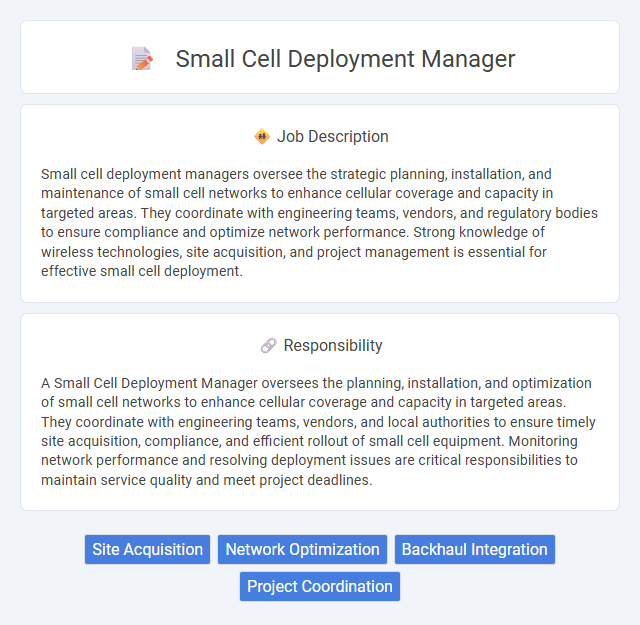
Small cell deployment managers oversee the strategic planning, installation, and maintenance of small cell networks to enhance cellular coverage and capacity in targeted areas. They coordinate with engineering teams, vendors, and regulatory bodies to ensure compliance and optimize network performance. Strong knowledge of wireless technologies, site acquisition, and project management is essential for effective small cell deployment.
People who possess strong problem-solving skills and enjoy working in dynamic, technology-driven environments are likely suitable for the role of Small Cell Deployment Manager. Individuals comfortable with coordinating multiple teams, managing project timelines, and adapting to evolving network requirements probably find this job fulfilling. Candidates who thrive under pressure and have a good understanding of telecommunications infrastructure may have a higher probability of succeeding in this position.
Qualification
A Small Cell Deployment Manager must possess strong expertise in telecommunications, specifically in small cell technology, network infrastructure, and RF engineering. Key qualifications include a bachelor's degree in electrical engineering, telecommunications, or related fields, alongside experience in project management and team coordination. Proficiency in LTE/5G network standards, site acquisition processes, and regulatory compliance is essential to effectively oversee small cell installation and optimization.
Responsibility
A Small Cell Deployment Manager oversees the planning, installation, and optimization of small cell networks to enhance cellular coverage and capacity in targeted areas. They coordinate with engineering teams, vendors, and local authorities to ensure timely site acquisition, compliance, and efficient rollout of small cell equipment. Monitoring network performance and resolving deployment issues are critical responsibilities to maintain service quality and meet project deadlines.
Benefit
Small cell deployment managers likely enhance network coverage and capacity by efficiently coordinating the installation of small cells, which can lead to improved user experience and reduced service disruptions. They probably support cost savings by optimizing site acquisition and deployment schedules, minimizing delays and resource waste. Their role may also contribute to quicker rollout times, enabling telecom operators to meet increasing data demands and maintain competitive advantages.
Challenge
Managing small cell deployment likely involves complex coordination of site acquisitions, regulatory compliance, and technical integration in dense urban environments. Challenges probably arise from limited physical space, evolving network standards, and the necessity to minimize service disruptions during installations. Balancing cost efficiency with timely rollouts and stakeholder communication may also present significant obstacles in this role.
Career Advancement
Small Cell Deployment Manager roles offer significant career advancement potential within the telecommunications industry, emphasizing the management of network infrastructure to optimize 5G and LTE coverage. Professionals in this position gain expertise in project coordination, site acquisition, and regulatory compliance, which are critical for progressing to senior management or network operations leadership roles. Mastery of small cell technology and deployment strategies positions individuals for higher responsibilities, including strategic planning and regional network expansion oversight.
Key Terms
Site Acquisition
A Small Cell Deployment Manager specializing in Site Acquisition coordinates the identification, negotiation, and permitting of optimal locations for small cell installations to enhance network coverage and capacity. This role requires expertise in zoning regulations, local government approvals, and stakeholder engagement to secure timely site access. Success in site acquisition directly impacts the efficiency and expansion of 5G and LTE networks by enabling seamless infrastructure deployment.
Network Optimization
A Small Cell Deployment Manager specializes in overseeing the installation and optimization of small cell networks to enhance wireless coverage and capacity in targeted areas. This role involves analyzing network performance data and coordinating with engineering teams to implement solutions that reduce interference and improve signal quality. Proficiency in radio frequency (RF) optimization tools and knowledge of 4G/5G technologies ensures efficient deployment and seamless integration within existing cellular infrastructures.
Backhaul Integration
Small cell deployment managers specialize in optimizing network performance through efficient backhaul integration, ensuring seamless connectivity between small cells and the core network. Their responsibilities include coordinating with vendors, validating transport links, and troubleshooting backhaul protocols such as Ethernet and microwave solutions. Expertise in LTE and 5G architecture is essential for managing backhaul scalability, minimizing latency, and supporting high-capacity data traffic.
Project Coordination
A Small Cell Deployment Manager specializes in overseeing the installation and integration of small cell networks to enhance wireless coverage and capacity. Project coordination involves scheduling tasks, managing resources, and liaising with contractors, vendors, and regulatory bodies to ensure timely execution within budget constraints. Effective communication and problem-solving skills are critical for aligning cross-functional teams and mitigating deployment risks in complex urban environments.
 kuljobs.com
kuljobs.com